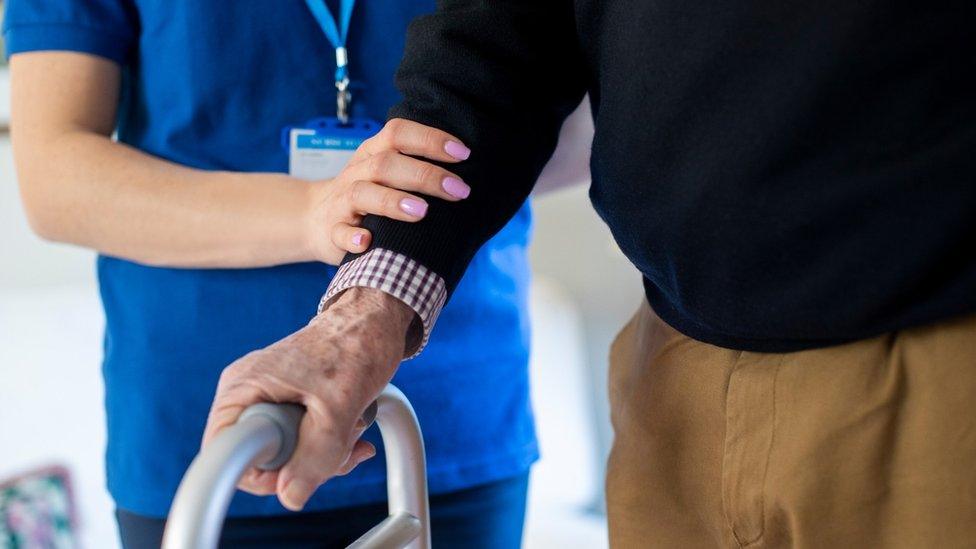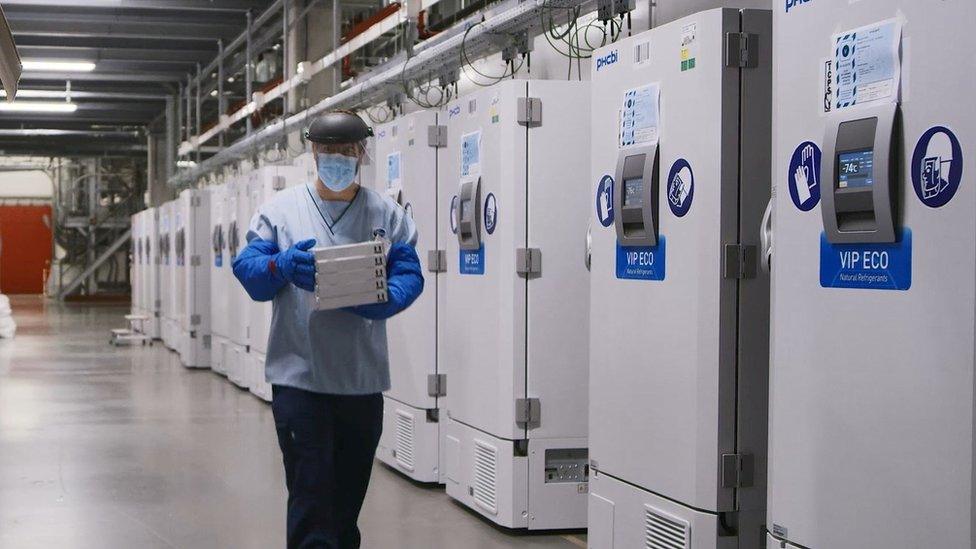Covid in Scotland: Vaccine will reach care homes from 14 December
- Published
- comments

Care home residents in Scotland will be able to receive the Pfizer/ BioNTech Covid vaccine from 14 December, the health secretary has confirmed.
There had been fears that homes would not be able to receive the first batch of doses due to logistical challenges.
But Jeanne Freeman said confirmation on how the vaccine can be transported and stored meant it would now be possible to deliver them to care homes.
The vaccines will be given to the vaccinators from Tuesday 8 December.
The health secretary said about 65,500 doses of the vaccine would arrive in Scotland by Tuesday.
The first consignment of the vaccine arrived in the UK on Thursday and it will now be distributed to vaccination centres across the four nations.
They will initially be stored in packs of 997 doses in specialist freezers around Scotland. The Pfizer vaccine needs to be kept at a temperature of -70C.
Ms Freeman said this posed "particular logistical challenges" when vaccinating people at or close to their homes.
But she told MSPs it had now been confirmed the vaccine could be transported in an unfrozen state for up to 12 hours.
It can also be broken down into smaller pack sizes and stored undiluted for up to five days, she said.
"So in effect we can take the vaccine to them [care homes] or close to them, and we will begin that exercise from 14 December," the health secretary said.
"From next Tuesday we will begin vaccinating first the vaccinators themselves and then work our way through the first cohorts of health and social care workers."

The vaccine is made in Belgium and has to be stored at around -70C
The health secretary said Scotland already had the 160 vaccinators who would be needed from Tuesday.
The government is also "on track" to recruit 2,000 vaccinators and support staff by the end of January.
"An existing core of trained and experienced vaccinators from the flu programme will transition over to Covid vaccination over this month and next," she said.
"We are actively recruiting from the emergency registers and the NHS Scotland accelerated recruitment portal and drawing from the wider clinical workforce of GPs, pharmacists, dentists and optometrists."
Underlying health conditions
Ms Freeman said that pregnant women, or women who were planning to be pregnant in the next three months, should not take the Pfizer vaccine.
And she confirmed 16 and 17-year-olds with underlying health conditions would be vaccinated, following a request from the Joint Committee on Vaccination and Immunisation.
Half of the initial supplies of the vaccine that arrive in Scotland in December will be held back for the second dose.
The Scottish government has bought 23 ultra-low temperature freezers to store the vaccine.
They will be based at all major acute hospitals across the country and on Scotland's islands.

Ms Freeman said the introduction of mass vaccination centres was "further down the line".
But she added that she hoped the first wave of the vaccination programme would be completed by the spring.
The Scottish Conservatives said more clarity was still needed on staff recruitment, vaccination centres, freezers, and the long-term plans.
Everyone in Scotland over the age of 18 will be offered a vaccination. The UK's Joint Committee on Vaccination and Immunisation (JCVI) has drawn up advice on how people should be prioritised.
What is the vaccine?
It is a new type called an mRNA vaccine that uses a tiny fragment of genetic code from the pandemic virus to teach the body how to fight Covid-19 and build immunity.
An mRNA vaccine has never been approved for use in humans before, although people have received them in clinical trials.
The vaccine must be stored at around -70C and will be transported in special boxes, packed in dry ice. Once delivered, it can be kept for up to five days in a fridge.

The vaccine was 95% effective for all groups in the trials, including elderly people.
The head of the MHRA, Dr June Raine, said despite the speed of approval, no corners have been cut.
Batches of the vaccine will be tested in labs "so that every single vaccine that goes out meets the same high standards of safety", she said.